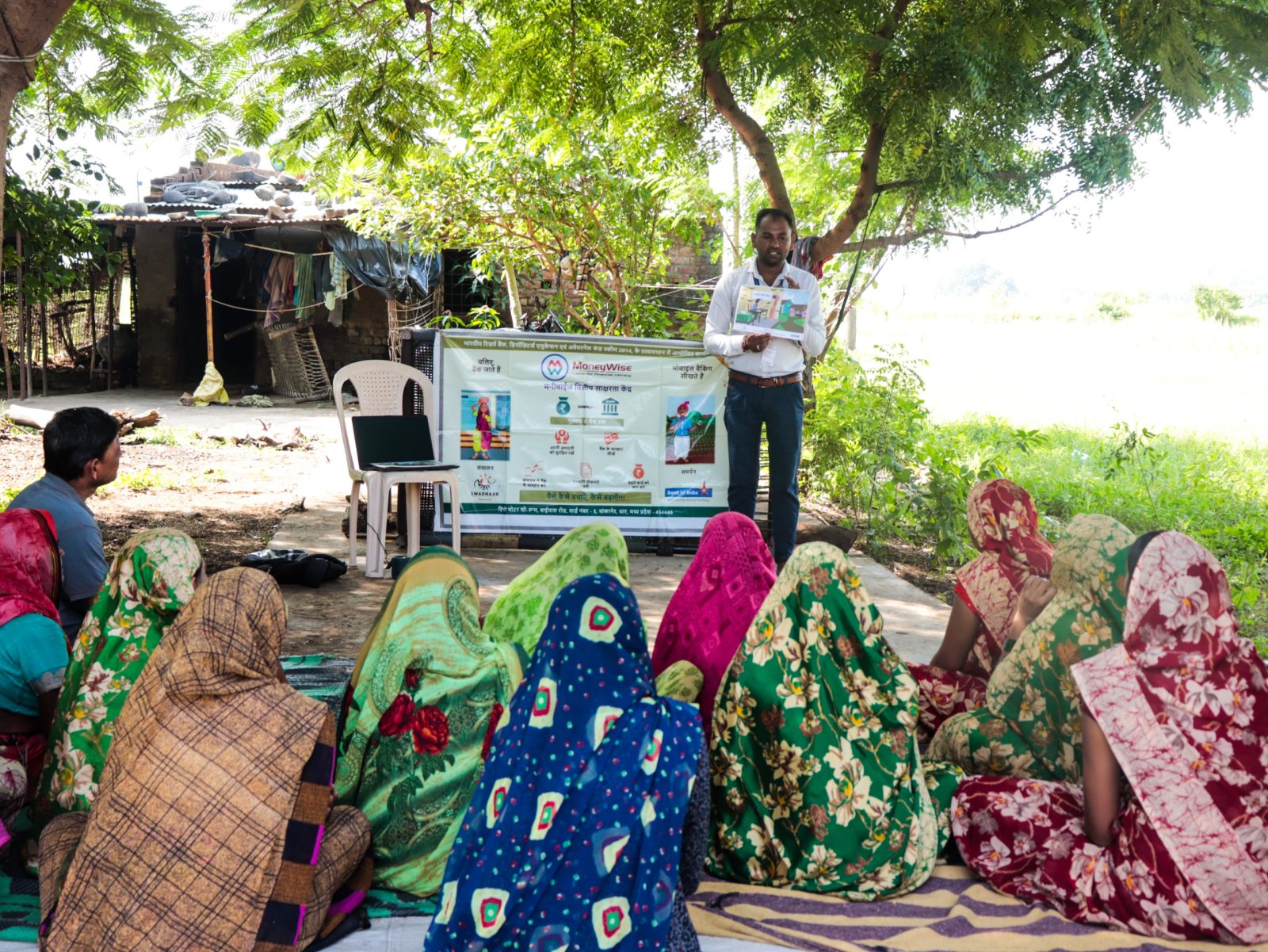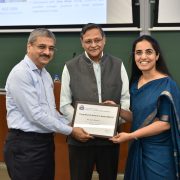Veena (nee Gosain) Mankar, PGP 1975

Caption: A Swadhaar FinAccess training in a village
In the colourful and joyous tapestry of my life, the years 1975 and 2004 stand as pivotal milestones—bookends that delineate my journey from the hallowed halls of IIMA, to the rough roads of social impact and financial inclusion. The year 2004, was a watershed for me. As my son embarked on his 10th standard examination—a rite of passage fraught with academic pressure and societal expectations—I found myself at a crossroad, grappling with the delicate balance between professional ambition and personal commitment. I decided to take a break, and it became “our exam,” not his alone.
It was during this hiatus from banking, on a routine market visit, a chance conversation with a vegetable vendor served as a sobering shock of systemic inequities pervading our society. A few vendors wanted to get together and buy a small vehicle to make the daily trips to the mandi, vastly bringing down the cost, time and effort required for their daily purchases. I was confronted with the harsh realities of urban poverty and financial exclusion—a stark contrast to the world of high finance I had inhabited for so long. I had just witnessed the retail financial revolution in India. Our oldest daughter, a newly minted lawyer, was getting credit card offers by the dozen, and here a hardworking vegetable vendor had no access to credit for improving her business. I was shocked to hear that informal credit costs for her were at 60-120% per annum. Further conversations only brought forth further anguish. She had little savings and no insurance. Since setbacks are a reality of life, frequent, high cost and unproductive debt was her bane. Her story was echoed by many others. I felt it was my responsibility, as a banker, to do something to change lives.
Serendipitously, I shared these deeply unsettling conversations with a dear friend, Haseena Vahanvaty. Suddenly, we were two women on a crusade, to bring financial services to low income and vulnerable women in the Mumbai slums, and reverse decades of systemic injustice to those who need it the most. Our first challenge was to raise capital, to give ourselves at least a three-year runway.

Caption: Co-founders of Swadhaar, Haseena Vahanvaty (left) with Veena Mankar (right).
Armed with a business plan in my pocket, and in New York to visit our younger daughter, I took a detour to meet the Michael and Susan Dell Foundation. The young lady I met said it was her first day at this job and she had a mandate to look at urban microfinance in India. After two hours, we felt a shared sense of purpose. She expressed a strong interest in recommending us for three years of start-up funding, with two conditions – the first to agree to convert our model into a commercial enterprise if successful and the second, to bring in promoters’ capital of around Rs 30 lakh.
We had between us a third of that. We reached out to our friends, and waited with bated breath to post the first batch of emails. In a short time, our friends, including a few of my classmates of PGP 75, had put their hands on their hearts and committed the much needed capital for our non-profit venture, with only the desire to give back and no expectation of a commercial return.
The Dell grant materialised and through a series of unplanned encounters, Unitus Capital and Accion International also came on board. With three credible institutions as partners, we launched the non-profit Swadhaar FinAccess which disbursed its first loan in March 2006. By the end of the year, we had a portfolio of Rs 40 lakh. Our clients came with tears in their eyes with heartening stories, of getting out of the clutches of the money lender, of girls going to school and of growing businesses. We also started financial literacy sessions, realising that what they called “emergencies” requiring a loan, were often life cycle events of birth, death, education and marriage. These need budgeting and prudent planning.

Caption: The founding team
As the year progressed, it was exhilarating to see our clients with their backs up straighter and hope in their eyes. But then came a crisis. Our client centric approach had made us go lenient on repayments and the portfolio started looking unsustainable. With our partners’ support, we dug deep and came up with the efficiencies needed to bring the portfolio back on track. Our values, of Responsibility, Integrity, Client First, and Excellence in all– stayed unchanged.
The year 2008 marked a significant milestone in our evolution, as we launched Swadhaar FinServe, a commercial Non-Banking Financial Company (NBFC), with capital from existing partners (both institutional and individuals). A few more classmates joined in at this time. The ensuing years bore witness to a mosaic of triumphs and tribulations—from navigating the tumultuous waters of the Andhra Pradesh crisis to weathering the storm of demonetization. Yet, through it all, our commitment to our mission remained unwavering, as we continued to innovate and adapt to meet the evolving needs of our clients.
Post 2008, our non-profit, Swadhaar FinAccess, focussed on financial and digital literacy, as the third pillar of Financial Inclusion – the others being supply and demand. Between 2015 and 2018, the NBFC was gradually acquired by RBL Bank and now is a flourishing subsidiary of the bank, bringing holistic banking to those who are underserved. I look at that as our legacy, especially Haseena’s, as we sadly lost her in January 2015 after a battle with cancer. Haseena and I used to often talk about what success would look like? We agreed that if we could reach a million customers and a bank decided to serve our customers well, we would have accomplished what we set out to do and go home. Yet, we are still here.

Caption: Recent photo of the author in her office
With the digital financial infrastructure that India boasts today, built on the rails of Aadhaar and UPI, it is theoretically possible for every Indian household to have access to appropriate and affordable financial products and services. The reality, however, is far behind. The missing link of financial literacy remains an imperative. In 2021, amid the pandemic, RBI gave Swadhaar FinAccess, the mandate to expand its ‘Centres for Financial Literacy’ from 20 to 150. It is a tribute to our team that they achieved this within a year. A stretch in normal times, it was an extraordinary feat then.
I will not go into further details – a word limit constrains me. Sufficient to say that Swadhaar FinAccess has grown from strength to strength. We reached our milestone of success, of 1 million participants in the literacy sessions, by March 2022, adding another million the following year. It now reaches over 3.5 million participants annually.
We have added a ‘Knowledge Centre’ to our work to undertake behavioural research. This informs our content and training methodology to improve effectiveness and adoption of financial services. Our training content and processes are now largely digital, keeping pace with the changing appetite for information consumption, and our proprietary app, Swadhaar Saathi, empowers users to track their cash flow and financial goals. We continue to observe, learn and evolve our approach – to move our clients from being listeners in the household conversation on finances, to having agency to build their and their family’s financial health.
I embrace the belief that when we dare to dream, the universe conspires in our favour. May our journey serve as a beacon of hope and inspiration, illuminating the path towards a future where financial health is not a privilege but a right.
Please do visit us at www.swadhaar.org or on our Instagram page @swadhaar_finaccess.
Veena (nee Gosain) Mankar is a Founder Director at Swadhaar FinAccess and lives at Mumbai. Previously she has worked at leading banks/financial institutions including ICICI Limited (the precursor to the Bank) WestLB Germany, Emirates Bank International and Fim Bank, Malta. She currently serves on a few Boards, including RBL Bank and other public limited entities. She can be reached at veena.mankar@swadhaar.org



